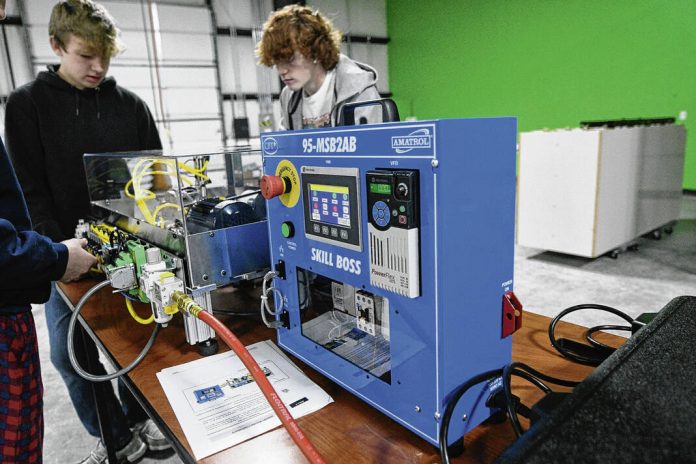
Whiteland Community High School freshmen Austin Bedel and Harrison Garrett work on a skill boss machine as part of an advanced manufacturing class hosted by Ivy Tech Community College’s Franklin campus Jan. 17. The Indiana Department of Education has a new plan to get more students work-based opportunities.
DAILY JOURNAL FILE PHOTO
The Indiana Department of Education’s latest plan for high school curriculum will give local students greater access to internships before they graduate.
The plan is aimed to increase employability skills for students who don’t go to college and set up for success the students who do go.
Johnson County school leaders are now thinking of the ramifications of rethinking high school, and what it will mean for students moving forward.
Behind the plan
IDOE officials completed Indiana Graduation Landscape Analysis in May, the first part of a years-long process to rethink the high school experience. The work will focus on making diploma requirements more flexible and centered on students’ future plans, improving access to high-quality work-based learning opportunities and increasing chances for students to earn postsecondary credentials before they graduate high school, according to an IDOE news release.
The strategy follows the IDOE’s implementation of Graduation Pathways in 2019 in an attempt to increase college and career readiness among high school students. As part of the program, students are required to fulfill credit requirements in core subjects such as math, science and social studies, and must also complete a project-based, service-based or work-based experience meant to demonstrate employability skills.
The first high school class required to follow Graduation Pathways graduated this spring.
IDOE leaders looked at Indiana GPS, which stands for Graduates Prepared to Succeed, to set parameters for rethinking high school. The 20 indicators on Indiana GPS include: Graduation Pathways completion rate, third-grade literacy, SAT performance and advanced coursework prior to ninth grade, among other categories, according to the dashboard website.
The analysis shows Hoosiers who have some education beyond high school will likely earn about $1 million more than their peers who don’t. It shows 64% of high school students earn college credit, but less than 5% of students earn a college or career credential before graduation, according to IDOE documents.
Rethinking high school won’t mean replacing Graduation Pathways, but strengthening them by making sure what students are doing sets them up for success in the future, said Jason Callahan, assistant secretary of student pathways and opportunities for the IDOE.
“We’re working to define high credentials of value, high-quality work-based learning and how you can personalize and build out a diploma. We plan to have this ready for early adopters, for students who want to opt in for the 2024-25 school year. We wouldn’t look to make this mandatory until maybe a few years later,” Callahan said. “Ultimately, our goal is to empower students. This is a vehicle toward life fulfillment, equipping more students with credentials and experiences to lead to life-fulfilling career opportunities.”
What this means locally
Greenwood Community High School recently adopted the Indiana College Core program, which will allow students to graduate with a full year’s worth of college credits. School officials are still waiting for additional guidance on how they should implement the IDOE’s latest plan, with administrators planning to meet IDOE officials this fall, said Michael Gasaway, the school’s principal.
Next month, Greenwood will send its first student to Ivy Tech Community College to earn college credits through an advanced manufacturing program. School officials can also work with Aspire Johnson County to determine which businesses might be open to student internships, he said.
“One of the biggest things between high school and the next step is trying to create a more individualized plan for each student to give them more choices,” Gasaway said. “Moving forward, there will be more opportunities for students to go out and get internships and work-based learning opportunities, with Ivy Tech and businesses willing to take students on.”
Edinburgh Community High School leaders will work with C4 Columbus Area Career Connections, Aspire Johnson County and Indiana colleges to determine how to best improve work-based opportunities for students, Edinburgh Superintendent Ron Ross said in an email.
“We are waiting for more concrete information from the state,” he said. “We are working to strengthen partnerships with area businesses to create more work-based learning opportunities for our students. We are also working with area universities to make more advanced placement, dual credit and college courses available to our students.”
The IDOE’s plan will make the experiences students undergo to fulfill pathways requirements more meaningful and targeted, said Duke Lines, interim principal at Whiteland Community High School.
Whiteland students already participate in advanced manufacturing classes at Ivy Tech and career and technical education classes at Central Nine Career Center.
“I think it allows us to go deeper into what we’re doing,” Lines said. “Allowing for personalization and flexibility will deepen relationships with community partners, and instead of just a blitz in these different areas, there will be more of a concentration and focus. It will prepare them for deeper experiences for whatever comes next.”
Franklin Community High School is also part of Central Nine and school leaders are planning how to get students involved in advanced manufacturing at Ivy Tech. Beyond advanced manufacturing, rethinking high school will provide a great opportunity for students to take the next step to work directly with local businesses as part of their studies, said David Clendening, superintendent of Franklin Community School Corporation.
“It’s a nice foundation, it just needs to grow and provide an opportunity to flourish. Our plan is baby steps and working with the high school to get (students) exposure to those opportunities,” he said. “I think there will be companies that look at getting kids into the electrician space, into the plumbing space. We need companies to come on board and look at that.”




